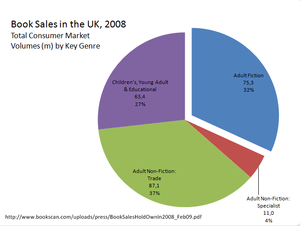 Image via WikipediaBut realistically speaking, most authors have some sort of level of interest in how their titles do on the market. Curiosity, eagerness, wishful thinking or a purely commercial mind-set will eventually push an author to harbour the desire to know how a title is doing, as far as sales are concerned. Not reviews. Not favourable comments on blogs. Not letters or emails from distant relatives or friends. No ... sales. Simple numbers of sales as they appear in a column of figures. Or on a pie-chart. Or a graph. They are not interested in global book sales of all the authors in a genre, or all the authors in a given region. They want to know how many books they have sold.
Image via WikipediaBut realistically speaking, most authors have some sort of level of interest in how their titles do on the market. Curiosity, eagerness, wishful thinking or a purely commercial mind-set will eventually push an author to harbour the desire to know how a title is doing, as far as sales are concerned. Not reviews. Not favourable comments on blogs. Not letters or emails from distant relatives or friends. No ... sales. Simple numbers of sales as they appear in a column of figures. Or on a pie-chart. Or a graph. They are not interested in global book sales of all the authors in a genre, or all the authors in a given region. They want to know how many books they have sold.Most independent publishers send out half-yearly royalties statements to their authors. It used to be quarterly, but time and staff restrictions have seen the periods lengthen somewhat. So every six months, authors' eyes travel up and down those columns of figures and seek ... you've guessed it. Numbers of sales. How many copies of any title sold in that six-month period. How many people clicked that button. How many copies Amazon posted off. How many paperbacks in paperbags?
 |
| davidderrico.com |
This convenience, this facility, has the in-built ability to drive you mad. Make an addict of you. Take you from your writing. Sales could become the bane of your life. Arrggh! It used to be submission fever. Agent allergy. Rejection phobia. Now it's figure fatigue. I know some authors who keep a daily eye on what's happening on Amazon, Sony Ebook Store, Smashwords, and a couple of other online retailers. Daily. I know more than just a couple who have a peep many times a day. This can do a number of things to one's self-esteen, one's general morale, and one's schedule. It can completely stifle the will to carry on writing, or it can fill one with such euphoria it's impossible to write another word.
Every second day is a scenario that seems more sane. Let's face it - a sale is a sale. Its record will not fade away if one waits until the morrow. Weekly, too. A weekly peep will still give you a great idea. If an author were to look once a month, even, the figure is sure to gladden.
The temptation to look, however, is enormous. It's more than just an itch or idea. It's a compulsion.
Isn't it?




Like the song says, Rosanne, 'Don't count your money while you're sittin' at the table; time enough for countin' when the dealin's done.'
ReplyDeleteWhat I like about taking in sales figures (with the song's advice in mind) only in spring and fall is that each statement covers lucky streaks and bad runs: a peak season when sales rise (Christmas and Easter) and a silly season when they're often in the doldrums (post-New Year and high summer).
The great beauty of ebooks, of course, is that they don't have that nail-biting six-weeks-to-two months make-or-break sales window allowed to print books in brick and mortar before being returned unsold. Dead. A clever publisher and author can pique interest and peak ebook sales any time by taking advantage of a topical promotional opportuniry ... or by imaginativelty creating one.
But a six monthly survey of figures is a much healthier and more meaningful way of weighing up *real* overall performance of a title.
Bestests. Neil
Ah, how true that is, Neil. It makes mathematical and logical sense to compare one discrete period with another. And yes, it's true that imagination and creativity need to accompany literary talent. Just writing the books is never enough!
ReplyDeleteGuilty as charged (Smashwords twice a day - hey, they've been there a month, it's still a novelty :)).
ReplyDeleteHope your sales are running off the charts, Rosanne!
ReplyDeleteThanks for your good wishes, Desert Rocks. If you make your charts very small, sales ALWAYS run off the edges 8-]
ReplyDeleteMaybe I'm lucky in that I have not yet figured out how to check my stats. Or maybe that my expectations are low - being a rwlative newcomer.
ReplyDeleteHi Rosanne, as I am waiting for approval on Smashwords, I'm looking forward to the day when I become addicted because I will have something to look at!!
ReplyDeleteCheers
Shirley
Hi Rosanne, great article. Yes, I'm guilty of checking my sales too often, usually on Novel Rank, though. I behave myself on KDP and Smashwords. :)
ReplyDelete